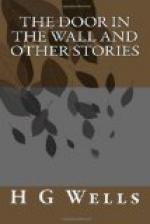The master mathematician sat in his private room and pushed the papers from him. His calculations were already finished. In a small white phial there still remained a little of the drug that had kept him awake and active for four long nights. Each day, serene, explicit, patient as ever, he had given his lecture to his students, and then had come back at once to this momentous calculation. His face was grave, a little drawn and hectic from his drugged activity. For some time he seemed lost in thought. Then he went to the window, and the blind went up with a click. Half way up the sky, over the clustering roofs, chimneys and steeples of the city, hung the star.
He looked at it as one might look into the eyes of a brave enemy. “You may kill me,” he said after a silence. “But I can hold you—and all the universe for that matter—in the grip of this little brain. I would not change. Even now.”
He looked at the little phial. “There will be no need of sleep again,” he said. The next day at noon—punctual to the minute, he entered his lecture theatre, put his hat on the end of the table as his habit was, and carefully selected a large piece of chalk. It was a joke among his students that he could not lecture without that piece of chalk to fumble in his fingers, and once he had been stricken to impotence by their hiding his supply. He came and looked under his grey eyebrows at the rising tiers of young fresh faces, and spoke with his accustomed studied commonness of phrasing. “Circumstances have arisen—circumstances beyond my control,” he said and paused, “which will debar me from completing the course I had designed. It would seem, gentlemen, if I may put the thing clearly and briefly, that—Man has lived in vain.”
The students glanced at one another. Had they heard aright? Mad? Raised eyebrows and grinning lips there were, but one or two faces remained intent upon his calm grey-fringed face. “It will be interesting,” he was saying, “to devote this morning to an exposition, so far as I can make it clear to you, of the calculations that have led me to this conclusion. Let us assume—”
He turned towards the blackboard, meditating a diagram in the way that was usual to him. “What was that about ‘lived in vain?’” whispered one student to another. “Listen,” said the other, nodding towards the lecturer.
And presently they began to understand.
That night the star rose later, for its proper eastward motion had carried it some way across Leo towards Virgo, and its brightness was so great that the sky became a luminous blue as it rose, and every star was hidden in its turn, save only Jupiter near the zenith, Capella, Aldebaran, Sirius and the pointers of the Bear. It was very white and beautiful. In many parts of the world that night a pallid halo encircled it about. It was perceptibly larger; in the clear refractive sky of the tropics it seemed as if it were nearly a quarter the size of the moon. The frost was still on the ground in England, but the world was as brightly lit as if it were midsummer moonlight. One could see to read quite ordinary print by that cold clear light, and in the cities the lamps burnt yellow and wan.




